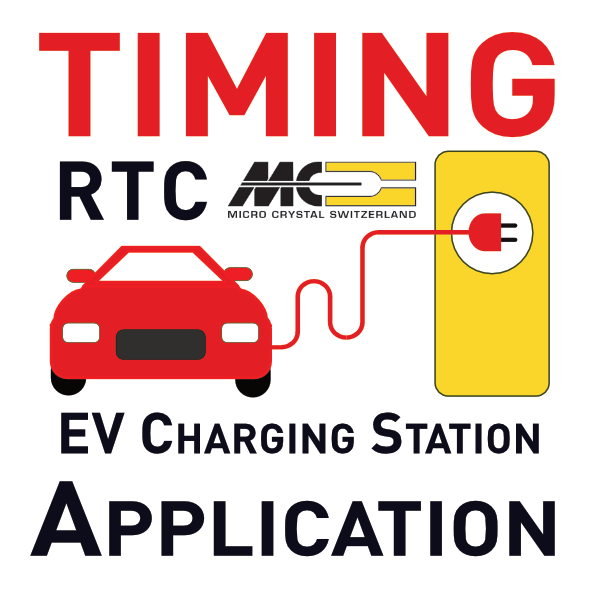
Charging stations, also called electric vehicle charging station belong to the electric vehicle supply equipment (EVSE). It is a machine that supplies electric energy from the grid to charge plug-in electric vehicles (EVs).
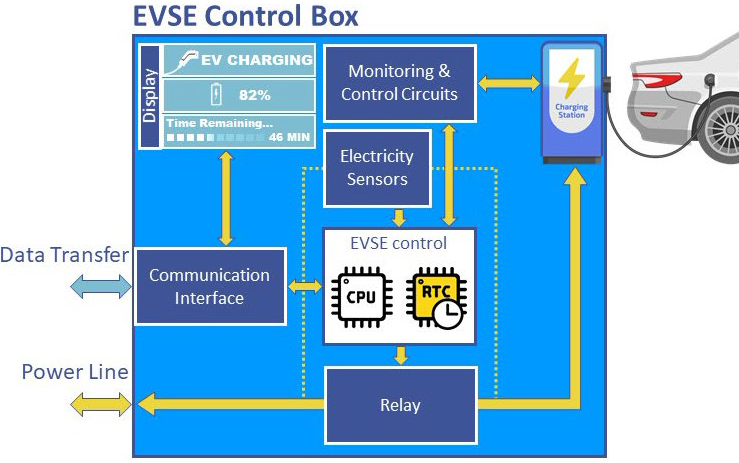
From simple domestic wall-box to more sophisticated charger in the public space, the EVSE control system managing the infrastructure, mainly consists of power stages, driven relays, energy metering, communication lines and user interface.
The internal smart meter is used to quantify the energy transfer and communicates with energy grid and users.
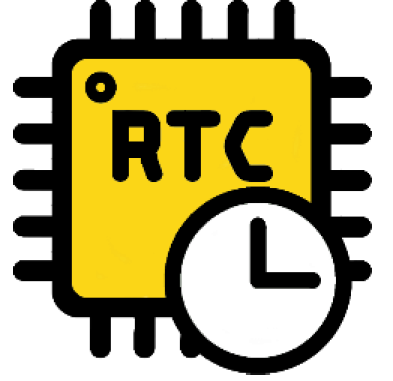
Enabling stable, reliable and intelligent smart meter operation within an EVSE, Real-Time Clock (RTC) modules from Micro Crystal participate to the optimization and the sustainable usage of power grids.
| P/N | Interface | EV charging specific requirements |
| RV-3129-C3 | I2C | Extended T range (-40 to +125°C), ± 6 ppm time accuracy over temperature |
| RV-3149-C3 | SPI | Extended T range (-40 to +125°C), ± 6 ppm time accuracy over temperature |
| RV-3028-C7 | I2C | Standard T range (-40 to +85°C), ± 1 ppm time accuracy @ 25°C |
| RV-3032-C7 | I2C | Standard T range (-40 to +85°C)± 3 ppm time accuracy over temperature @ 160nA (3V) |
The location the EVSE is installed lead to different complex specifications but some common key factors for their operation can be specified. These has to be weightend depending on if its a home installed wall-box in the garage, non public charging points on companies parking lots or public installed EVSEs.
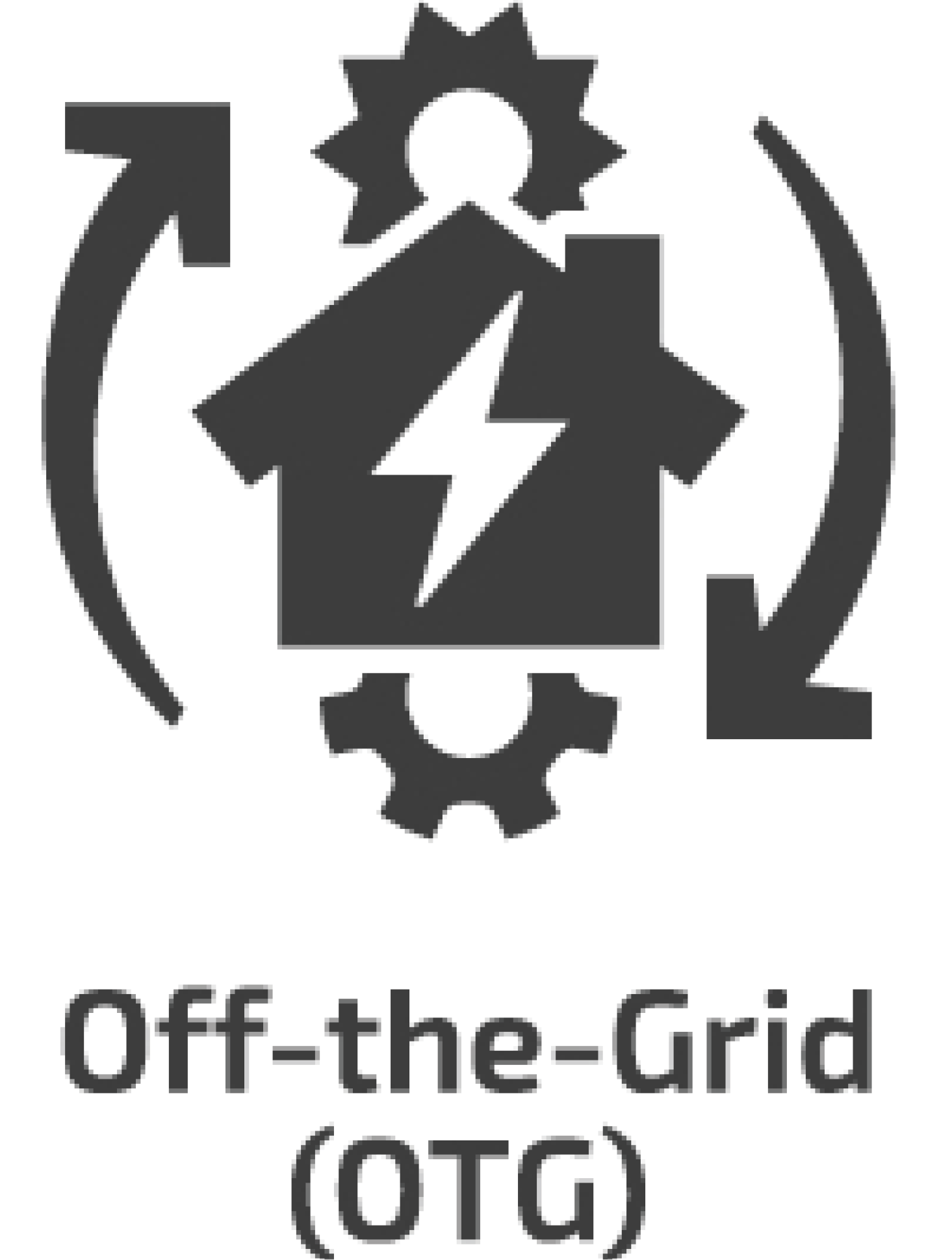 Remote control issue can occur when facilities are located in underground parking lots or remote area for . Using RTC ensures accurate timekeeping even when connection with grid communication network is interrupted. Also useful for Off-the-Grid applications or when electric vehicle owners return power to the grid during peak or emergency situations to earn revenue.
Remote control issue can occur when facilities are located in underground parking lots or remote area for . Using RTC ensures accurate timekeeping even when connection with grid communication network is interrupted. Also useful for Off-the-Grid applications or when electric vehicle owners return power to the grid during peak or emergency situations to earn revenue.
 Most EV chargers typically remain in standby for 85% of their lifetime. Think of a private wall-box being used once a week because the car owner only have to drive 20-25km per day. By using an ultra-low-power RTC Module for timekeeping while MCU is in deep sleep mode, consumers and businesses can reduce their commercial ev charging station costs.
Most EV chargers typically remain in standby for 85% of their lifetime. Think of a private wall-box being used once a week because the car owner only have to drive 20-25km per day. By using an ultra-low-power RTC Module for timekeeping while MCU is in deep sleep mode, consumers and businesses can reduce their commercial ev charging station costs.
With a state of the art current consumption of only 45nA the RV-3028-C7 enables very low standby currents. Read more about the RV-3028-C7.
 One of the best ways to charge EV cheaply at home is to take advantage of cheap off-peak energy rates through Time-of-use (TOU) or time-based tariff billing. With an RTC, smart meter in EVSE is always synchronized. MCU is using reliable real-time data allowing smart operation based on programmed charging settings (TOU, off-peak periods) and can support edge computing with reliable reporting from the EV charging node for smart grid company and users.
One of the best ways to charge EV cheaply at home is to take advantage of cheap off-peak energy rates through Time-of-use (TOU) or time-based tariff billing. With an RTC, smart meter in EVSE is always synchronized. MCU is using reliable real-time data allowing smart operation based on programmed charging settings (TOU, off-peak periods) and can support edge computing with reliable reporting from the EV charging node for smart grid company and users.
To have an accurate time basis even in environments where the ambient temperature is changing over the day (e.g. direct sunlight exposure vs. darkness at night) a temperature compensation is essential. With RV-3149-C3, RV-3129-C3 or the new introduced RV-3032-C7 this can be acheived and guaranteed directly.
 Integrating an RTC not only adds reliability and efficiency to the system while saving energy. Extra features like an integrated 12-bit temperature sensor allows EVSE thermal monitoring, alarming and extreme high accuracy through timing temperature compensation.
Integrating an RTC not only adds reliability and efficiency to the system while saving energy. Extra features like an integrated 12-bit temperature sensor allows EVSE thermal monitoring, alarming and extreme high accuracy through timing temperature compensation.
If your are looking for such additional features your find them integrated in the RV-3032-C7. If you don’t need such high resolution also RV-3129-C3 and RV-3149-C3 can provide a temperature measurement.
Sustainable power saving operation
Reliable timekeeping
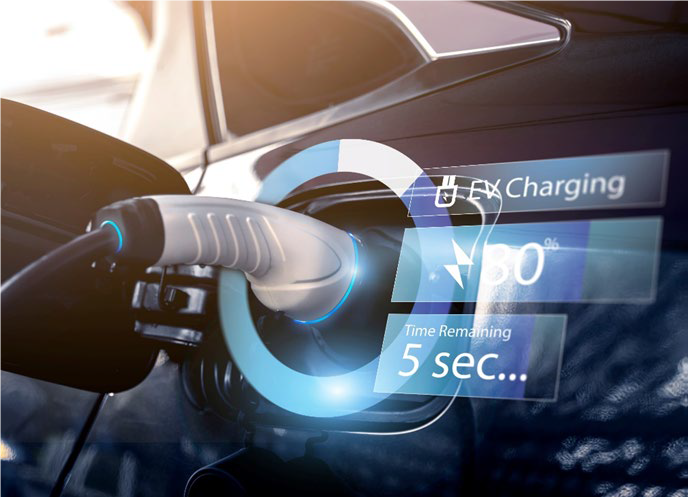
To guarantee these parameters Micro Crystal verifies 100% of the parts in the adjusted frequency and the accuracy ensuring high quality level for safe and robust operation. All RTC parts from Micro Crystal are PPAP’ed & AEC-Q200 qualified and ideally suited for automotive applications. Micro Crystal as a company and production sites are ISO 9001 (Quality), ISO 14001 (Environmental) and IATF 16949 (Automotive) certified.
Ask our team about the extensive additional development support in terms of demo-board and Windows graphical user interface for configuration to start into your development directly. For more complex applications like the EVSE often running Linux on the host processor Linux kernel driver are available on request.
If your need more information on the here introduces RTC modules or your have other applications in mind were a different feature set is needed get in contact with us about the Micro Crystal’s whole RTC product range now